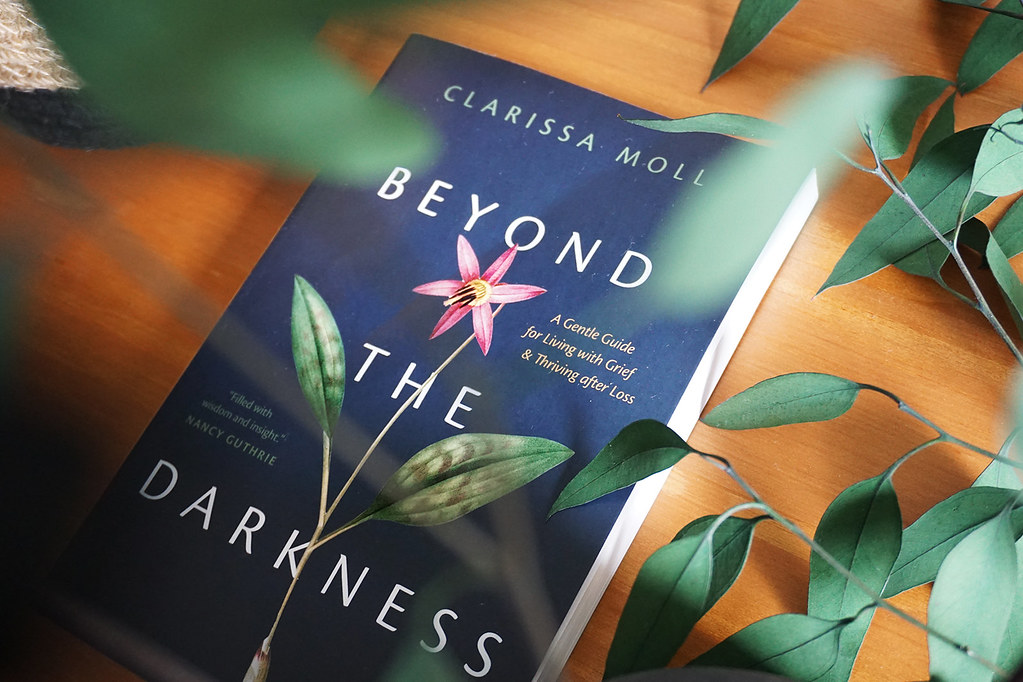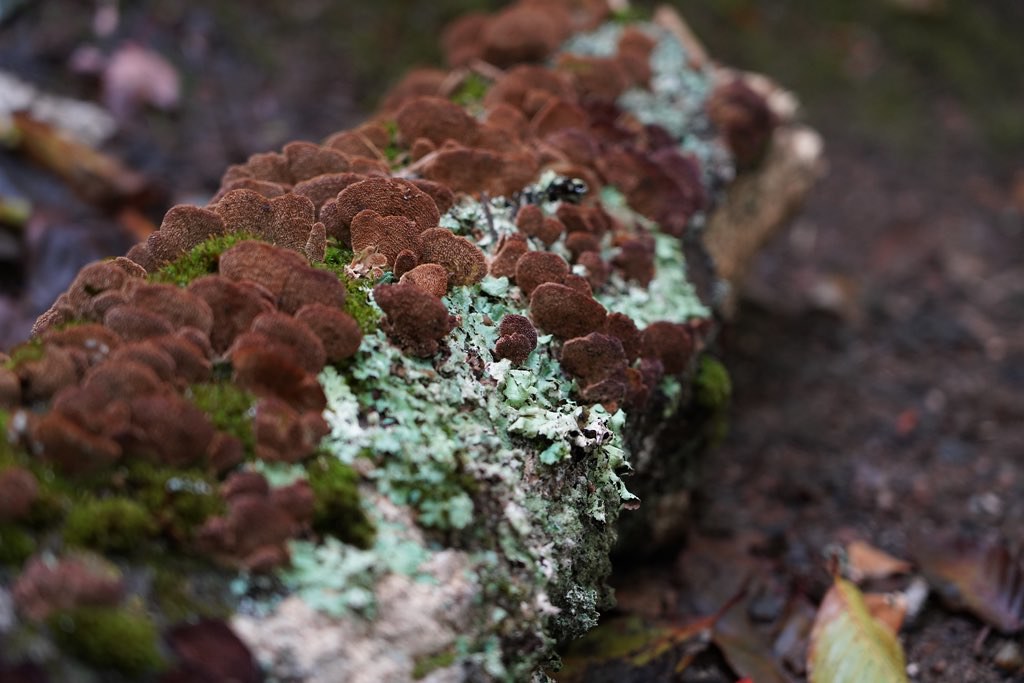Clarissa Moll and I connected after her husband and my father died suddenly and unexpectedly. As we’ve walked the road of grief together, Clarissa has offered companionship and comfort in the darkness that often enshrouds life after loss. Her story is both heartbreakingly honest and deeply hopeful, a balance that’s often hard to strike in a culture that doesn’t know what to do with death and sorrow. It’s an honor to invite her to the farm table today …
On one of our favorite family hikes in Washington’s Cascade Mountains, there’s a turn in the trail that always gives me pause. After almost two miles of walking through towering western red cedars and Douglas firs, a space opens up on the northerly side of the trail. For the first time, your gaze can rise beyond the trail at your feet to the expanse beyond. Through a frame of trees, the sky expands and you see verdant, forested mountains, layer after layer on to the horizon.
Whenever we get to this spot on the trail, I insist on a stop. A rocky ledge juts out between the trees, and I climb over, take a seat, and catch my breath—only to have it taken away again. The slog of the trail feels so different up here, high above the rest of the world, surrounded by mountain majesty. If the most beautiful views are found at the hardest climbs, I daresay, this trail is worth every footfall.
The old gospel hymn assures us, “It will be worth it all when we see Jesus. Life’s trials will seem so small when we see Christ.” But when you’re in the slough of grief, truth is often obscured by the muck and mire of sorrow. It might even feel cliché.
“Hope, for the Christian, is everything.”
When your eyes are so trained on the rocky, rooted trail before you, it can be hard to hear that you need to lift your eyes to look for more.
But for the believer, the hope of the gospel shapes our grief. It is the lens through which we view death. It colors our sorrow and infuses our sadness with persistent joy. It reminds us that the flourishing we pursue in this life is only a foretaste of all that is to come. Hope, for the Christian, is everything.








“The power that raised Jesus Christ from the dead is accessible to us now through his Spirit. The new life that awaits us has already begun.”
N. T. Wright tells us, “God’s plan is not to abandon this world, the world which he said was ‘very good.’ Rather, he intends to remake it. And when he does, he will raise all his people to new bodily life to live in it. That is the promise of the Christian gospel.”
This is the truth in which we stand. Moreover, it is the truth we are living into each day. The power that raised Jesus Christ from the dead is accessible to us now through his Spirit. The new life that awaits us has already begun. As Romans 13:11 says, “Salvation is nearer now than when we first believed.”
Because this truth enlivens us, we can be assured that flourishing awaits those of us who grieve, not just in the future but here and now. Just as our redemption began the first moment we believed, our new life after loss has already begun. It is our calling, then, to step forward and take hold of it with passion and purpose. With grief as our companion, we can live with joy as we eagerly await the fulfillment of God’s promises, knowing that the inauguration of his good and peaceable kingdom has already begun. Our feet are already pointed toward home.
“flourishing awaits those of us who grieve, not just in the future but here and now.”
How do I know this? I see it on the hikes I take with my children, and I read it in God’s Word. God has built all of creation for resilience, and resurrection is always his gracious pleasure.
Resilience is built into every cell of our bodies. Just as your body can repair from the physical stress of grief, your heart can also repair from the emotional toll of acute sorrow.
As comforter and guide, the Holy Spirit supports you as you engage in the rebuilding work that God has laid before you. Each day we live with grief, we can access “his incomparably great power,” says the apostle Paul to the Ephesians.
The same power that raised Jesus Christ from the dead can raise you from the dead too.
“God delights to make dead things alive again. He can and will do it for you, too.”
If you’ve felt like a part of you died after your person’s death, I hope this comes as amazingly good news. God delights to make dead things alive again. He can and will do it for you, too.
Our loved one’s death transforms us in the very hardest ways and in beautiful ways too. Parts of you died with your person’s death, parts survived, and—amazingly—parts have been born.
Each day is worth facing because a risen Jesus offers you not only resilience after loss but grave-defying restoration.
You can love life after loss. In grief and joy, God offers you a life made new, full to overflowing with his goodness.









“The empty tomb does not negate the graves we stand beside in this life, but it does transform them.”
When I talk to grieving Christians, they’ll often tell me, “I don’t know how someone could do this without Jesus.” And I have to agree.
The empty tomb does not negate the graves we stand beside in this life, but it does transform them.
As Paul reminds the Thessalonians, “We believe that Jesus died and rose again, and so we believe that God will bring with Jesus those who have fallen asleep in him.”
In the end, we can embrace grief’s companionship because of the empty tomb. When we’re aching and exhausted, the empty tomb reminds us that transformed bodies await us. When we feel the piercing loneliness of sorrow, the empty tomb assures us that death will lose its sting.
For the Christian, the empty tomb is the hinge pin of our hope in grief. Resurrection awaits those we love, and it awaits us, too. And though at times you’ll find it hard to believe, this hardest path you’ve ever walked will lead you home.

Clarissa Moll knows the landscape of loss all too well. Her life changed forever in 2019 when her husband, Rob, died unexpectedly while hiking―leaving her with four children to raise alone. In her debut book, Beyond the Darkness: A Gentle Guide for Living with Grief and Thriving after Loss, Clarissa offers her powerful personal narrative as well as honest, practical wisdom that will gently guide you toward flourishing amidst your own loss. Sorrow is a dark and painful road. You don’t need to walk it alone. This book is a practical, soulful guide for the hardest path you’ve ever walked.
Award-winning writer and cohost of Christianity Today’s “Surprised by Grief” podcast, Clarissa Moll helps bereaved people thrive after loss. Her writing appears at Christianity Today, The Gospel Coalition, RELEVANT, Grief Digest, and more. Connect with Clarissa at www.clarissamoll.com or on Instagram.







